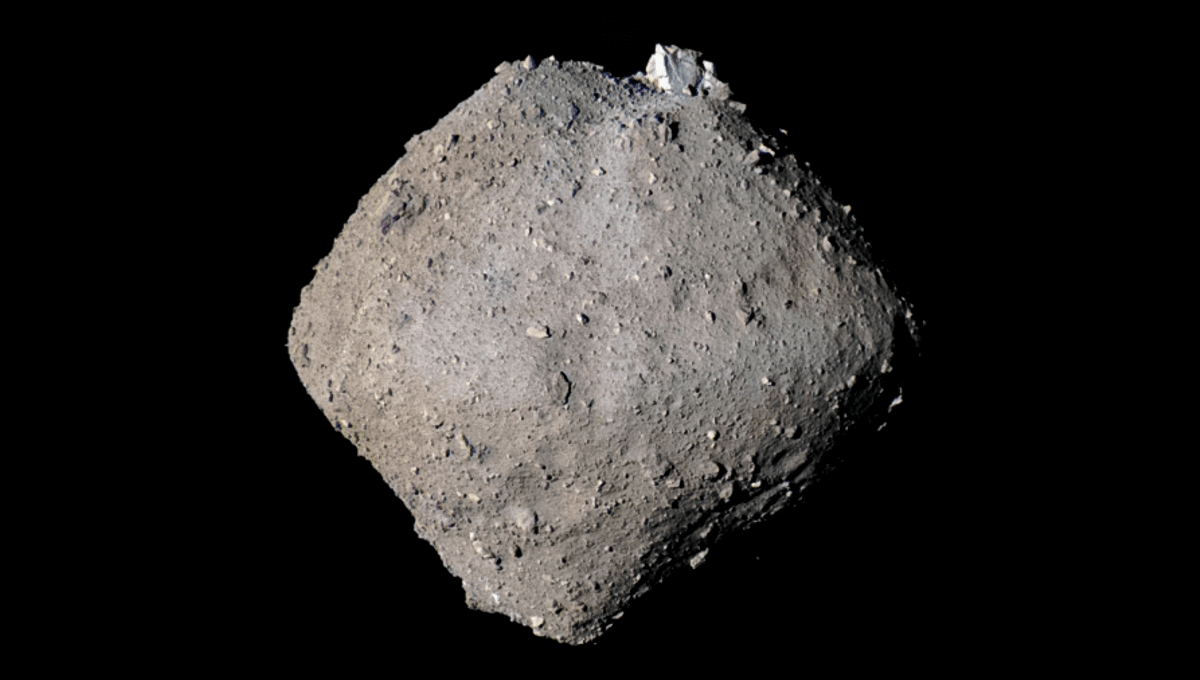
Samples of material from Ryugu show very different compositions depending on where on the asteroid they come from. An investigation of the causes of these variations has revealed the influence of water on a larger body the asteroid was once part of.
While astronomers and geologists anxiously wait to get access to samples from the asteroid Bennu, returned by OSIRIS REx, work continues on the much smaller Ryugu sample returned by Hayabusa2. Water is not the first thing we think of looking at apparently dry space rocks such as Ryugu, but it turns out it played a key part in the asteroid’s evolution.
Hayabusa2 collected samples from Ryugu using two processes. First it made a soft landing, grabbing some of the surface dust. The second landing came with more of an impact, allowing the spacecraft access to some pieces from beneath the surface. This combination was deliberately chosen because of the expectation that Ryugu would not be homogenous. We might not have been able to conduct a truly extensive survey of its parts, but at least we could gain some sense of the variation.
The decision turned out to be wise. However, just knowing that Ryugu isn’t all made the same is one thing; working out why is the real challenge.
Almost a hundred authors have shown that the differences in isotope composition are much greater for chromium than titanium, two spots apart on the periodic table. They attribute this to the fact that chromium is mildly soluble in water, while titanium is not, indicating water played a key part in its development.
Ryugu most closely resembles meteorites known as CI (Ivuna type) chondrites, whose composition resembles the Sun’s, hydrogen and helium aside. They’re considered our best guide to the early Solar System. Like all meteorites, CI chondrites have been modified by exposure to Earth’s atmosphere, and without getting original samples from objects like Ryugu, we don’t know by how much. Consequently, planetary scientists trying to reveal the formation of the asteroids from which these meteorites come haven’t been able to tell whether differences in distribution between soluble and insoluble elements reflect their original nature or not.
Ryugu’s variation can be seen not just in its chemistry, but in the distribution of isotopes. For this study, the authors investigated the distribution of ratios of chromium-52 and 54 and titanium-50 and 47. All of these isotopes are stable; they do not break down, so Ryugu has the same amount of each as when it formed out of the protoplanetary disk around the Sun. They’re also chemically identical. If they were gases, the lighter isotopes might escape more easily, but each has a very high boiling point.
Consequently, it is not surprising that all the samples from Ryugu stick closely to its average titanium ratio of 1.77. Indeed, what variation there is could well be caused by experimental error reflecting small samples. On the other hand, the ratio between the chromium isotopes varies by almost a factor of two.
The authors attribute this difference to Ryugu’s chromium having dissolved in water and moved around as a result, with isotopes migrating slightly differently, depending on their mass. They conclude that Ryugu’s parent body was able to support water sufficiently to allow this movement, albeit often on a scale of millimeters. This finding is consistent with previous work, which used a different path to identify the presence of water on Ryugu’s predecessor.
Two larger asteroids, Eulalia and Polana, have been identified as possible sites Ryugu may have been knocked off in a collision.
The study is published in Science Advances.
Source Link: Water On Ryugu’s Parent Shaped The Distribution Of Its Elements